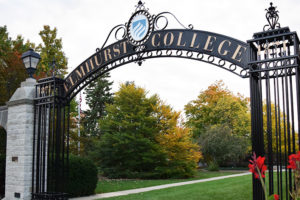
Feminism is the younger sister of democracy, and the struggle of one is inexorably intertwined with the other in an ongoing quest for equality and freedom.
That was a key message delivered March 29 in a lecture by Emily Swafford on Keeping the Feminist Promise: Women and Gender in History. Because the two are so intertwined in history, Swafford said, “A democracy that excludes women is no democracy at all.”
A Ph.D. candidate in 20th Century U.S. history at the University of Chicago, Swafford spoke at Elmhurst as part of the Genevieve Staudt Lecture series, which is given annually during Women’s History Month.
Swafford noted that the struggles for equal rights that have united women are often forgotten once a particular battle has been won. For example, the women’s movement in the early 20th century was focused on obtaining voting rights, an effort that brought together diverse groups of women.
Swafford described one group as “patient and plodding,” working pragmatically for years, on a state-by-state basis, for a constitutional amendment. Another group took a more in-your-face approach and was led by Alice Paul, a young activist who was jailed for picketing the White House and who went on a hunger strike that called more attention to the movement.
That, Swafford said, convinced President Woodrow Wilson that he was inconsistent on rights issues, and Wilson ultimately supported adoption of the 19th Amendment, which gives women the right to vote.
Swafford said that feminine solidarity, which she described as “mothers and daughters working together,” faded after women obtained voting rights and there was no longer a central issue to rally around. Feminism didn’t become widespread again until the 1970s, when women mobilized to obtain abortion rights, Title IX for funding women’s athletics, and equality in the workplace.
But after the activism of the 1970s, Swafford noted, the women’s movement again fractured and generally went dormant.
“When you get what you want, it looks like the fight is over,” she said, adding that despite major advances in equality, “women face the same question they always have: Do we count as equal citizens or do we not?”
For example, women still face health care issues that men don’t, such as whether the costs of pregnancy and childbirth should be covered by insurance. The day before Swafford’s lecture, a controversial bill that would allow employers and insurance companies to opt out of covering contraception for religious reasons was defeated in the Arizona state senate.
“It’s the same question of who should speak for women,” Swafford said. “Shouldn’t women speak for women?”
Women also face what she called a “double bind”: At the same time they have to fight for their unique needs and rights, they also have to campaign for the same rights granted to men.
“You can’t get rid of being a woman, and I don’t know that we should,” she said.
Swafford cited the 2010 book The Feminist Promise, by University of Chicago historian Christine Stansell, as a detailed chronicle of how women over more than 200 years were part of a broad social movement toward democracy. Early U.S. feminists, for example, were aligned with the abolitionist movement because both sought equality.
Stansell’s book illustrates why it is important to rethink women and gender in history, Swafford said, adding, “To keep the feminist promise, we must understand how women and women’s rights have been at the heart of democracy.”
Swafford’s dissertation, Democracy’s Proving Ground: The Wives and Families of U.S. Servicemen in Germany between World War II and Vietnam, focuses on how American families played a role in promoting democracy in Cold War Germany.
The U.S. allowed wives and children to live with servicemen in Germany after the war, as a way to give them a more normal family life, but Swafford noted that the interaction of American women with their German housekeepers and German society helped establish a connection between family life and democracy.
For Germans who had lived under a fascist regime, witnessing the home life of Americans demonstrated that “democracy was a way of life and not an ideology.”
The Genevieve Staudt Guestship Lecture is named for Elmhurst’s first dean of women. Staudt was dean of women from 1932 to 1961 and dean of students from 1948 to 1961 at a time when few women held such positions.
Swafford acknowledged Staudt’s years of service, noting that she served Elmhurst at a time “when women were often viewed as incapable of leadership.”